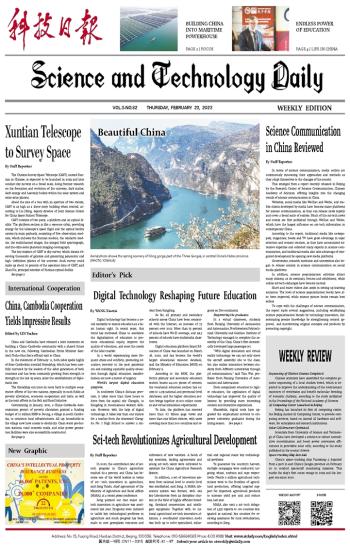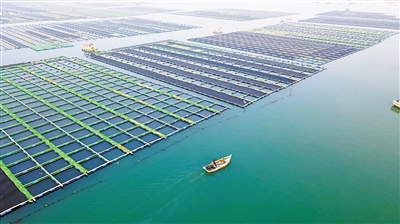
 Endless Power of Education
Endless Power of Education Building China into Maritime Powerhouse
Building China into Maritime Powerhouse Xuntian Telescope to Survey Space
Xuntian Telescope to Survey Space Beautiful China
Beautiful China Science Communication in China Reviewed
Science Communication in China Reviewed Digital Technology Reshaping Future Education
Digital Technology Reshaping Future Education China, Cambodia Cooperation Yields Impressive Results
China, Cambodia Cooperation Yields Impressive Results WEEKLY REVIEW
WEEKLY REVIEW Sci-tech Revolutionizes Agricultural Development
Sci-tech Revolutionizes Agricultural Development New Graphic
New Graphic WECHAT ACCOUNT
WECHAT ACCOUNT
 |
With a coastline stretching almost 32,000 km, China's future will forever be linked to the ocean. It is therefore inevitable that building China into a strong maritime country is a major strategic task for realizing the rejuvenation of the Chinese nation.
According to the report delivered to the 20th CPC National Congress, China will develop its maritime economy, protect the marine ecological environment, and step up efforts to build itself into a maritime powerhouse.
The marine economy is seen as the key to building strength in the marine sector, and is important for overall national economic growth. Emerging marine industries, such as seawater desalination, marine energy, and marine bio-pharmaceutics have all seen rapid growth.
According to data from the Ministry of Natural Resources (MNR), China's gross ocean product reached nine trillion RMB in 2021, up 8.3 percent year-on-year, contributing eight percent of the country's GDP expansion. This was a big boost to confidence in the development of the marine economy.
To promote high-quality growth of China's marine sector in the new era, much work remains to be done.
Monitoring oceans is vital for Earth's survival, and satellites are the primary means of long-term and independent observation of vast oceans and their associated coastal zones. According to Lin Mingsen, director of the National Satellite Ocean Application Service under MNR, the ability of ocean-observing satellite systems should be strengthened, so as to get precise data, which can help contribute to marine disaster prevention and mitigation.
Lin also stressed advancing the integration of AI, big data and other frontier technologies with satellite remote sensing applications, to roll out high-performance observation and exploitation technologies.
The ocean has abundant renewable energy sources, which can be captured and transformed into clean electricity. Wu Changbin, office director at China Ocean Mineral Resources R&D Association under MNR, said the exploration and research of deep-sea mineral resources should be strengthened, while enhancing the ability to evaluate resource and environmental carrying capacity in mining areas.
Protecting and restoring marine ecosystems is essential to the renewable development of ocean resources, which is also a requirement of green development, said Li Tiegang, director general of the First Institute of Oceanography (FIO) under MNR. He calls for exploring new technologies to prevent pollution in the basin, estuary and offshore waters, and establishing a comprehensive monitoring and management system for coastal zones, islands, and natural protected areas.
As China embarks on its journey towards its second centenary goal, the maritime community with a shared future proposed by China is expected to enter a new stage.
Centering on global frontiers in marine science, FIO will engage in the global innovation network, and initiate leading international marine research programs and cooperation projects, contributing Chinese wisdom to the development of global maritime affairs and the building of a maritime community with a shared future, said Li.

 Next
Next



